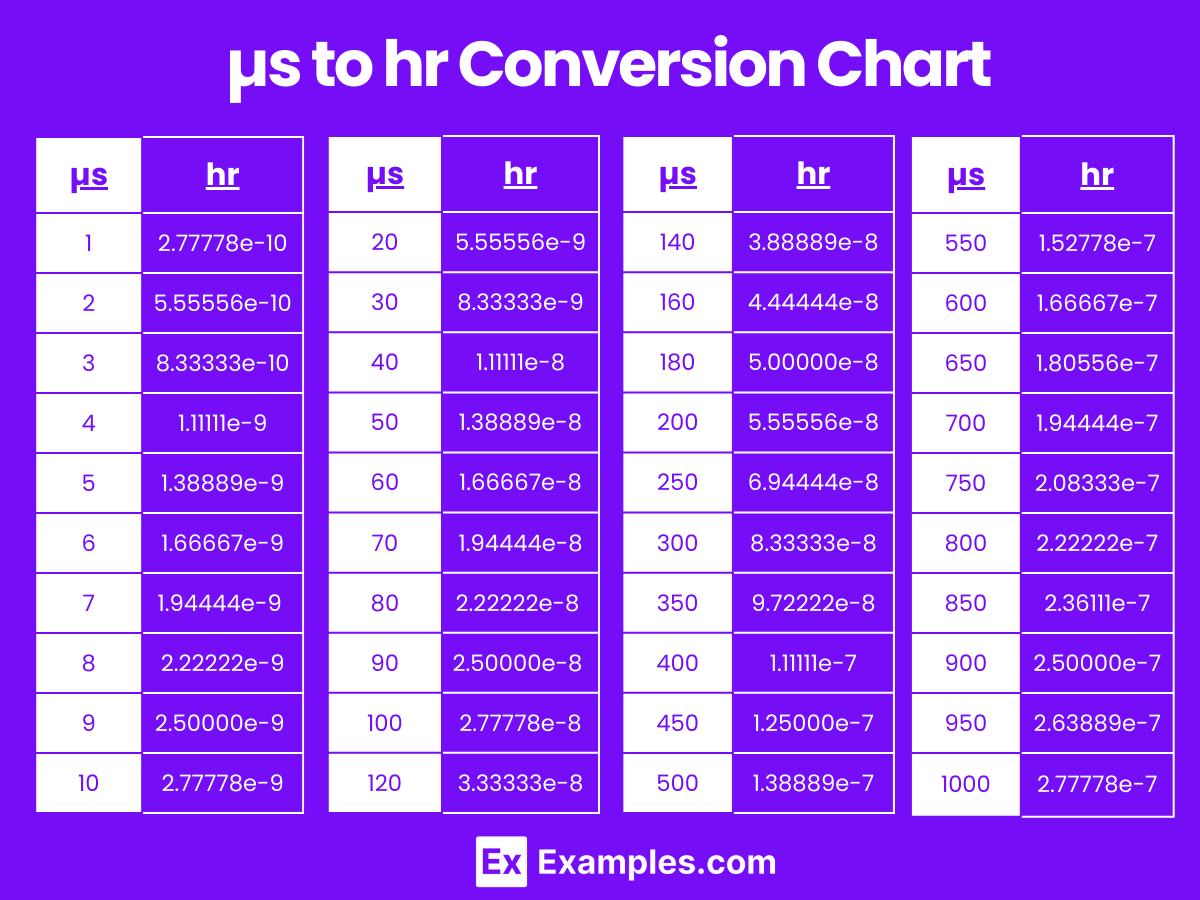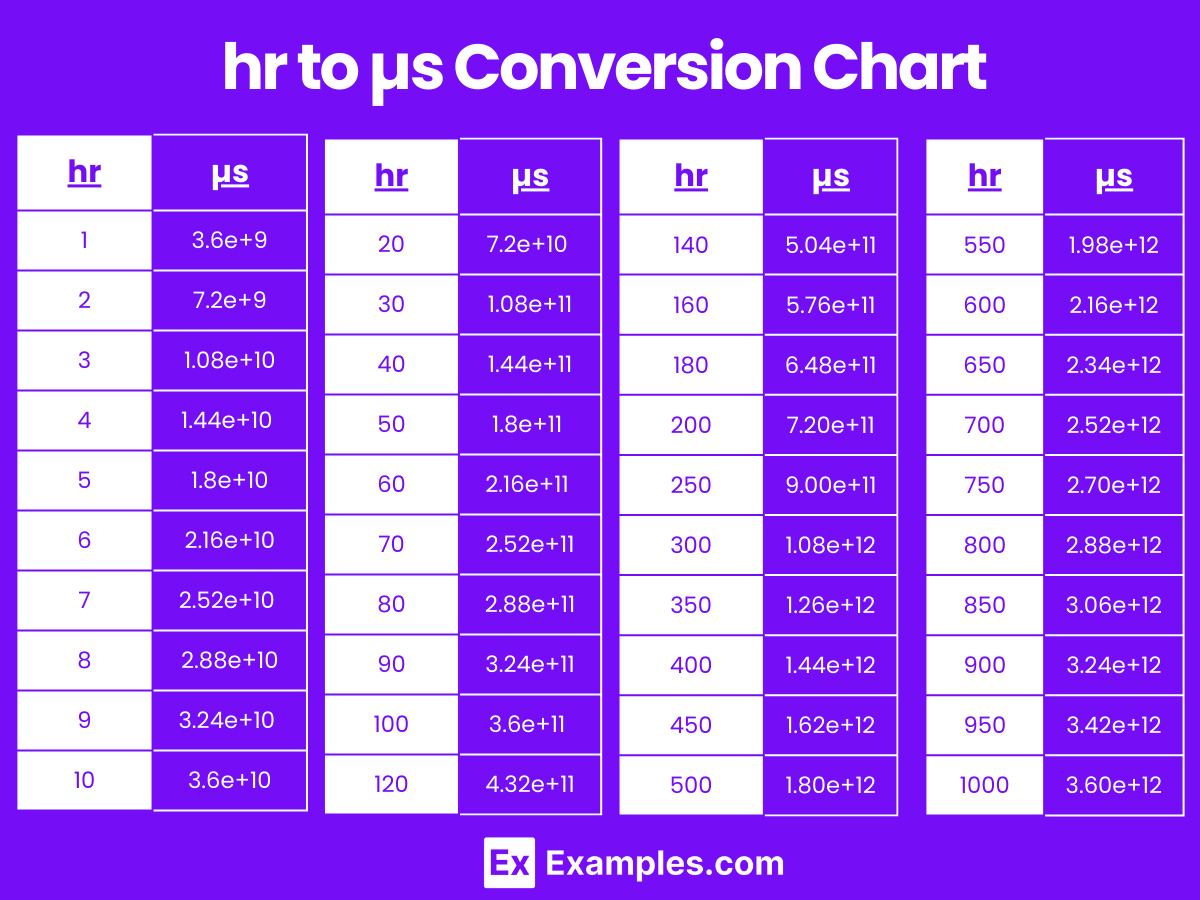Easily convert microseconds to hours and vice versa with Examples.com. Simply enter your data for quick and reliable results.
microseconds to hours
Formula: Time in hours(h) = Time in microseconds(µs) ∕ 3600000000
Microseconds :
hours :
| microseconds | hours |
|---|---|
| 1 | 2.7777777777777777e-10 |
hours to microseconds
Formula: Time in microseconds(µs) = Time in hours(h)x 3600000000
hours :
Microseconds :
| hours | microseconds |
|---|---|
| 1 | 3600000000 |
Time Converters to Microsecond (µm)
Time Converters to Hour (hr)
| Nanosecond to Hour | Microsecond to Hour | Millisecond to Hour |
| Second to Hour | Minute to Hour | Day to Hour |
| Week to Hour | Month to Hour | Calendar Year to Hour |
| Decade to Hour | Century to Hour |
Conversion Factors:
- Microseconds to Hours: 1 hour = 3,600,000,000 microseconds
- Hours to Microseconds: 1 microsecond = 1/3,600,000,000 hours
How to Convert Microseconds to Hours:
To convert microseconds to hours, divide the number of microseconds by 3,600,000,000.
Hours=Microseconds/3,600,000,000
Example: Convert 5,000,000,000 microseconds to hours.
Hours=5,000,000,000/3,600,000,000=1.3889 hours
How to Convert Hours to Microseconds:
To convert hours to microseconds, multiply the number of hours by 3,600,000,000.
Microseconds=Hours×3,600,000,000
Example: Convert 2 hours to microseconds.
Microseconds=2×3,600,000,000=7,200,000,000 microseconds
Microseconds to Hours Conversion Table
| Microseconds (µs) | Hours (hr) |
|---|---|
| 1 µs | 2.77778e-10 hr |
| 2 µs | 5.55556e-10 hr |
| 3 µs | 8.33333e-10 hr |
| 4 µs | 1.11111e-9 hr |
| 5 µs | 1.38889e-9 hr |
| 6 µs | 1.66667e-9 hr |
| 7 µs | 1.94444e-9 hr |
| 8 µs | 2.22222e-9 hr |
| 9 µs | 2.50000e-9 hr |
| 10 µs | 2.77778e-9 hr |
| 20 µs | 5.55556e-9 hr |
| 30 µs | 8.33333e-9 hr |
| 40 µs | 1.11111e-8 hr |
| 50 µs | 1.38889e-8 hr |
| 60 µs | 1.66667e-8 hr |
| 70 µs | 1.94444e-8 hr |
| 80 µs | 2.22222e-8 hr |
| 90 µs | 2.50000e-8 hr |
| 100 µs | 2.77778e-8 hr |
µs to hr Conversion Chart

Hours to Microseconds Conversion Table
| Hours (hr) | Microseconds (µs) |
|---|---|
| 1 hr | 3.6e+9 µs |
| 2 hr | 7.2e+9 µs |
| 3 hr | 1.08e+10 µs |
| 4 hr | 1.44e+10 µs |
| 5 hr | 1.8e+10 µs |
| 6 hr | 2.16e+10 µs |
| 7 hr | 2.52e+10 µs |
| 8 hr | 2.88e+10 µs |
| 9 hr | 3.24e+10 µs |
| 10 hr | 3.6e+10 µs |
| 20 hr | 7.2e+10 µs |
| 30 hr | 1.08e+11 µs |
| 40 hr | 1.44e+11 µs |
| 50 hr | 1.8e+11 µs |
| 60 hr | 2.16e+11 µs |
| 70 hr | 2.52e+11 µs |
| 80 hr | 2.88e+11 µs |
| 90 hr | 3.24e+11 µs |
| 100 hr | 3.6e+11 µs |
hr to µs Conversion Chart

Difference Between Microseconds to Hours
| Criteria | Microseconds (µs) | Hours (hr) |
|---|---|---|
| Definition | A microsecond is one-millionth of a second (10^-6 seconds). | An hour is a unit of time equal to 60 minutes or 3,600 seconds. |
| Symbol | Represented by “µs”. | Represented by “hr”. |
| Scale | Used for extremely short durations. | Used for longer durations. |
| Common Usage | Common in scientific measurements, electronics, and computing. | Common in daily life, scheduling, and work hours. |
| Conversion Factor | 1 µs = 2.77778e-10 hours. | 1 hr = 3.6e+9 microseconds. |
| Practical Examples | Measuring light pulses, CPU cycles, and reaction times. | Measuring the duration of meetings, travel time, and work shifts. |
| Granularity | Provides a very fine-grained measure of time. | Provides a coarse measure of time. |
| SI Unit | Not an SI base unit but derived from seconds (an SI base unit). | An SI unit, where 1 hour = 3600 seconds. |
1. Solved Examples on Converting Microseconds to Hours
Example 1
Convert 1,000,000,000 microseconds to hours.
Hours=1,000,000,000/3,600,000,000
Hours=0.27778
1,000,000,000 microseconds is equal to 0.27778 hours.
Example 2
Convert 5,400,000,000 microseconds to hours.
Hours=5,400,000,000/3,600,000,000
Hours=1.5
5,400,000,000 microseconds is equal to 1.5 hours.
Example 3
Convert 2,160,000,000 microseconds to hours.
Hours=2,160,000,000/3,600,000,000
Hours=0.6
2,160,000,000 microseconds is equal to 0.6 hours.
Example 4
Convert 10,800,000,000 microseconds to hours.
Hours=10,800,000,000/3,600,000,000Hours=3,600,000,00010,800,000,000
Hours=3
10,800,000,000 microseconds is equal to 3 hours.
Example 5
Convert 72,000,000 microseconds to hours.
Hours=72,000,000/3,600,000,000
Hours=0.02
72,000,000 microseconds is equal to 0.02 hours.
2. Solved Examples on Converting Hours to Microseconds
Example 1
Convert 0.5 hours to microseconds.
Microseconds=0.5×3,600,000,000
Microseconds=1,800,000,000
0.5 hours is equal to 1,800,000,000 microseconds.
Example 2
Convert 2 hours to microseconds.
Microseconds=2×3,600,000,000
Microseconds=7,200,000,000
2 hours is equal to 7,200,000,000 microseconds.
Example 3
Convert 1.25 hours to microseconds.
Microseconds=1.25×3,600,000,000
Microseconds=4,500,000,000
1.25 hours is equal to 4,500,000,000 microseconds.
Example 4
Convert 0.1 hours to microseconds.
Microseconds=0.1×3,600,000,000
Microseconds=360,000,000
0.1 hours is equal to 360,000,000 microseconds.
Example 5
Convert 3.6 hours to microseconds.
Microseconds=3.6×3,600,000,000
Microseconds=12,960,000,000
3.6 hours is equal to 12,960,000,000 microseconds.
How accurate is the conversion from microseconds to hours?
The conversion from microseconds to hours is highly accurate when done using the correct formula or reliable tools. However, in practical applications, the precision may depend on the context and the level of accuracy required.
Why is it important to convert microseconds to hours?
Converting microseconds to hours is important for understanding long-duration events or processes measured initially in very small time units. It helps in comparing and analyzing time intervals effectively.
How does microsecond to hour conversion impact computing performance?
In computing, understanding and optimizing the conversion between microseconds and hours can improve performance by ensuring processes are timed accurately, reducing latency, and enhancing synchronization between systems.
How do scientific fields benefit from microsecond to hour conversions?
Scientific fields like physics, chemistry, and engineering benefit from precise time measurements, enabling accurate experimentation, data analysis, and process optimization.
What tools can I use for converting microseconds to hours programmatically?
You can use various programming languages such as Python, Java, and C++ to create scripts for converting microseconds to hours. Python’s built-in libraries, for example, allow for easy and accurate time conversions using simple arithmetic operations.
Can I use an online calculator to convert microseconds to hours?
Yes, there are many online calculators available that can quickly convert microseconds to hours. Simply enter the number of microseconds, and the calculator will provide the equivalent in hours

